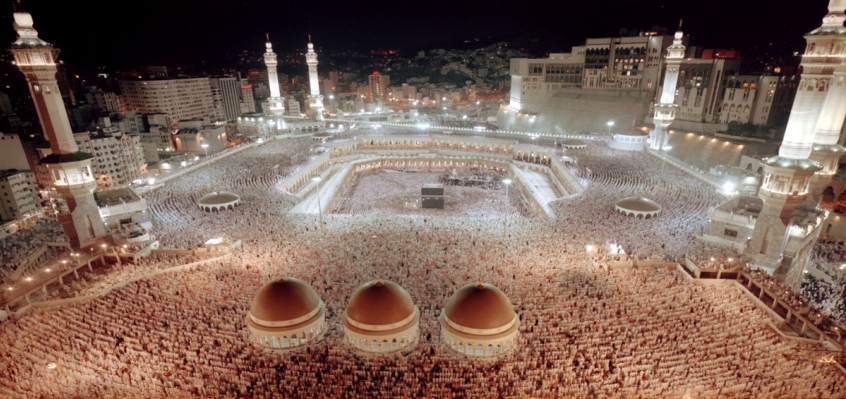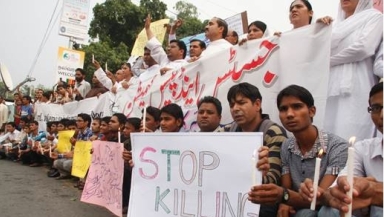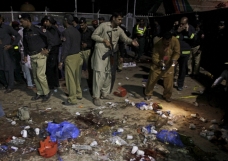Just before Easter a Church leader in Pakistan told Release International that the anger of extremists against Christians was "boiling over" and that Christians were on "high alert" for attacks over Easter.
We know what happened: a suicide bomber targeted Christians in a park in Lahore and 70 people died.
Over the Easter weekend, too, demonstrators – 25,000 of them, according to the Times of India – marched on the capital Islamabad's high-security 'red zone' demanding that the executed Mumtaz Qadri, hanged for murdering reforming Punjab governor Salman Taseer, be declared a martyr.
Taseer had supported a reform of the oppressive blasphemy laws, citing the case of the Christian woman, Asia Bibi, who has been in prison for allegedly breaking them. Police and security forces used tear gas on the demonstrators. The protest is continuing.
But why are Christians being targeted in Pakistan, and what accounts for the hostility shown toward them by the Muslim majority?
The answers are complex – and they show that in spite of the never-ending stream of tragedies and the appalling headlines, these might not even be the right questions. Attacks on Christians are part of a much wider pattern of extremism, fuelled by a poisonous ideology that is profoundly opposed to accommodating different beliefs. To understand what's happening today, we have to understand how Pakistan came to be the way it is.
1. Pakistan wasn't always so Muslim
Before it came into existence as a separate country at Partition in 1947, the country was far more religiously mixed. The horrific violence accompanying independence – around a million people died – saw the mass flight of Pakistani Hindus to India and Indian Muslims to Pakistan. Pakistan's population is now 95-98 per cent Muslim. But that's a broad category: most of them are Sunni Muslim, but there are also Shias and Ahmadis, though they aren't allowed to call themselves Muslims. Christians make up an estimated 1.6 per cent, most of them in Punjab province and most of them from families converted during the colonial era.
2. It wasn't always so extreme
There was a strong Sufi tradition in Pakistan, a religious movement involving worship at saints' shrines, festivals with music and dance, and popular mystical and devotional practices. Sufism is a heart-faith, less interested in the details of Islamic law. It tends to be more accommodating and more tolerant. In the early 1970s it started to lose its influence under attacks from fundamentalists who said it was un-Islamic. This fundamentalism was driven by the migration of Pakistanis to Middle Eastern countries where they discovered more hard-line versions of Islam, and by the rise of Islamic TV and radio stations promoting the Wahhabi or Salafist Islam current in Saudi Arabia.

Cheap air travel meant far more Pakistanis could visit Mecca and Medina, where they were exposed to Sharia traditions. There was a proliferation of hard-line mosques and madrassas in the country, many funded by Saudi Arabia.
3. The government reinforced the hardliners
Pakistan's first constitution, passed in 1973, declared it an 'Islamic Republic' – but it didn't say which version of Islam. The one that prevailed was 'Deobandi' Islam, with roots in 19th-century anti-colonialism. It is highly socially conservative and religiously dogmatic. Just a year after the constitution was agreed, the Deobandi-dominated Parliament passed a law saying people who believed in prophets after Muhammed (like the Ahmadis) were not Muslims at all.
In 1977 the Deobandi-influenced General Zia ul-Haq toppled the civilian government. Laws became increasingly Islamist, with legislation against drinking and extra-marital sexual relations. Sharia courts were introduced and the scope of the blasphemy laws – originally introduced by the British to try to control inter-communal violence – was drastically increased, exclusively favouring Muslims.
4. The Taliban turned on their creators
During the 1980s billions of dollars flowed into Pakistan from the US and Saudi Arabia, which believed Pakistan could help it resist Russia in Afghanistan. It did: Pakistan supported the Mujahideen and the 'good' rebel groups with arms, money and recruits. It thought it could control them, but its protegés turned on it: the extremist Taliban movement regards the government as compromised by its alliance with the West. Many of the madrassas or religious schools designed to produce Muslims devoted to protecting Pakistan have produced terrorists devoted to overthrowing it. The government and the army are now targets of the extremists. As one commentator, Maryam Khan, says: "In Pakistan today, Muslim extremists have become a dominant minority. The bitter tragedy is that the state has not merely abandoned the majority of the people, it has actually played an active role in breeding the militant organisations that are now undermining its own institutions."
5. Christians are targeted – but they aren't the only ones

Christians are falsely accused of blasphemy and imprisoned. A suicide bombing killed dozens at a church service in 2013. A Christian couple were burnt, possibly still alive, in a brick kiln in November 2014. But the hatred of the extremists is directed against Christians, Hindus, Sikhs, Ahmadis and other Muslims. Last year Shia mosques were bombed in Rawalpindi, Islamabad and Shikarpur. An assault on a bus in Karachi killed more than 40 people. Ahmadis have been lynched and beaten and their mosques have been burned. Sufi shrines have been attacked in Lahore and Karachi.
Christians are rightly heartbroken and appalled at what happened in Lahore. We pray for the victims and feel acutely for them. It's natural and right that we do so: the Christians who died are our brothers and sisters in Christ.
But when we understand more of the context in which such a dreadful event could take place, we resist the 'Muslims against Christians' narrative. It is far more complicated than that. Yes, hard-line Islamism has grown in Pakistan – but it has grown in good part because of the misguided policies of the West and of Saudi Arabia, which thought they could harness it in their Afghan adventures. And while it is influential, it doesn't reflect the opinion of the majority of Pakistanis.
Furthermore, it isn't just Christians who are under attack. Every minority is at risk – not just from malevolent extremists but from a flawed legal system administered judges and lawmakers who fear the consequences of challenging it.
We should pray for them all. Pakistan is under a spiritual oppression that can legitimately be described as demonic. There are very few signs of hope.















